- Home
- Iain Pears
Death and Restoration Page 5
Death and Restoration Read online
Page 5
“You’ve taken over watching me for the morning?”’ Mary said when she attracted Flavia’s attention with a wave.
“Faute de mieux. I have.”
“Splendid. I hope you are not going to pretend you don’t know me.”
“It was very unkind of you to do that last night,” Flavia observed gravely. “Poor girl was in tears this morning. She’s only young, you know.”
“I am sorry,” Mary Verney said, with every sign of meaning it. “I was in a bad mood and felt like kicking someone. She was the only person available. I shall apologize later. But I could say that it was unkind of you to put a tail on me like that. Personally, I felt I deserved better.”
“No. Arresting you would have been unkind. Keeping an eye on you is merely sensible.”
“At least we don’t have to play hide and seek all morning. If you’re with me, you can help. You dress so much better than I do. I need a nice coat. Nothing fancy, you know. Or too expensive. Something fitting my age and the Norfolk countryside. One doesn’t want to stand out too much. What do you suggest?”’
Flavia recommended a place which her mother visited on the rare occasions she came to Rome. She was a touch stouter than Mrs Verney, and a little older, but very much more vain as well. It would be a place to start. She led the way, once Mrs Verney had tried on a few more pairs of shoes and given up the attempt to find something which matched comfort and elegance. Such things are hard to find.
“Such an expensive city,” she said as they walked up the street. “I don’t know how you do it, dear. After all, you aren’t paid very much, I imagine.”
“We manage.”
“I was so glad to see that you and Jonathan are still together. When did you say you were getting married?”’
“The autumn. That’s the idea.”
“I am so pleased. I suppose it’s too much to expect an invitation?”’
“Probably.”
She sighed sadly. “I thought as much. Are you terribly cross with me?”’
“No. But only because I’ve taken care not to find out officially what it is I should be cross about. Otherwise I would be.”
“But you don’t trust me any more.”
Flavia grinned. Mary Verney was quite impossible to dislike for long. “Not an inch, no. I don’t know what you are doing here. It may be that the story you have told me is the gospel truth. Even thieves have to have holidays, after all. But I have my doubts.”
“It’s my own fault. However, this time I am being totally reliable. That I can guarantee.”
So they spent the rest of the morning shopping, Mary Verney buying a coat, with which she pronounced herself delighted, a pair of shoes which she didn’t need but couldn’t resist because they were so comfortable, and a leather handbag which was absurdly expensive but so awfully pretty. Then she led the way to a restaurant where they had a slow but (flavia had to admit) very enjoyable lunch and she had a small brandy while Flavia went out to phone for a replacement. This wasn’t quite the discreet surveillance she’d had in mind, but it was too late to do anything about that now. So she thought she might as well avoid making her manning problems worse, and removed Giulia from report writing.
“Oh, don’t bother about that,” she said wearily when Giulia asked where she should pick up the trail. “We’re in Also Moro. Just come straight in.”
Then she went back to the table to find Mary Verney looking impish. She’d paid the bill for both of them.
“Look, do you want me to be had up for corruption or something? We’ve had the spooks all over us recently. I told you …”
“It’s just a bill. But rather a big one. Don’t worry. Your name isn’t on anything. My treat.”
“I don’t want treats.”
“But you deserve one. You have just spent three hours taking me shopping, after all …”
“It was a pleasure.”
“Shall we go?”’
“No. We have to wait for Giulia. She will be your escort for the afternoon.”
“How lovely! This is the way to travel. I should have thought of this years ago.”
“We don’t make a habit of it. Ah, here’s Giulia,” she went on as the trainee arrived and crept cautiously up to their table, a worried frown of uncertainty on her face.
“I fear I owe you an apology, Giulia. Flavia was very cross with me for the inconsiderate way I behaved last night.”
“Oh, that’s all right,” said the surprised, but well-brought-up, trainee.
“Splendid. Now, you go back to work, Flavia. And Giulia and I will have a lovely afternoon together. I thought I might visit some old art-dealing friends of mine. Some of them are a bit … perhaps, Giulia, you wouldn’t mind being my niece for the afternoon? We don’t want to frighten anybody, do we?”’
Flavia just about managed to suppress a smile at the disconcerted and uncomfortable look on Giulia’s face. “Enjoy yourselves.”
“We will,” Mary Verney said. Giulia looked more doubtful.
Having nothing better to do that morning, Argyll walked across town to the monastery of San Giovanni to visit Dan Menzies and the Caravaggio. It wasn’t in the slightest bit necessary, although it was in the back of his mind that perhaps, just perhaps, he might sniff around and see if he could find out something about this picture. Then he could write it up—and it didn’t matter whether it was by Caravaggio or not—and get a little publication out of it. It also provided an opportunity to mess around with Flavia’s case. Not that he should, of course, but the prospect offered a bit of variety. Teaching and marking things was all very well, but no one could say that it made the adrenaline run through the veins at high speed. Unless, of course, you found yourself in a lecture room with seventy students and then discovered you’d forgotten to bring your notes. Even then, it wasn’t certain anyone would notice.
And it was a lovely day. The sun was shining and the bus routes were sufficiently complicated to make it not worthwhile waiting in the polluted street for one to come along. It was a decent stroll and put him into a sunny frame of mind. He crossed the river at the island, then did a slight detour through the prettier parts of the Aventino before climbing the hill and getting into the evermore out-of-the-way streets and alleys, one of which contained the surprisingly modest entrance to the monastery of San Giovanni. The baroque style is not normally associated with spiritual humility, but somehow the architect had pulled the trick off. The gateway, all peeling terracotta, had the regulation curls and swirls and twists, but it was all done on a small and almost domestic scale, as though it was the entrance to a private, and not very grand, house. The door itself, however, was well defended to keep the corruptions of the material world outside. Solid, sun-bleached oak was covered in a regular pattern of large metal studs for extra strength, and the little porter’s hole was protected by a thick grid of iron bars. The only modern touch was a little doorbell drilled into the stucco, into which someone had stuck a postcard. The Order of St John the Pietist, it said in several languages, so Argyll pressed it.
He had half hoped for a shuffling of feet and a creak as the porthole opened to reveal a bent-over old monk, tonsured and muttering. But no such picturesque details were forthcoming: what he got instead was a buzz and a click from the gate as the electric lock opened up. The modern world, he thought as he pushed and went inside. No romance.
It is one of the great delights of Rome that not even a long-term, assiduous resident is safe from surprise. Any street in the city, no matter where and no matter how seedy or shabby it looks at first glance, is capable of containing some little gem tucked away in an obscure corner, passed by nearly all the time and waiting to astonish. Sometimes it is a toy-box-sized Renaissance chapel, around which a twentieth-century developer has squeezed a vast, lumbering block of flats, or which has been accidentally turned into a traffic roundabout. Or the remains of a Roman palace nestling between a truck stop and a railway line. Or it is a Renaissance pile, converted into flats and hammered incessant
ly by fumes and the noise of traffic, but which still has its delicate, colonnaded courtyard, with moss on the cobbles and a sculpted fountain of nymphs and goddesses tinkling away to welcome home the weary commuters in the evening.
The headquarters of the Giovannisti (as such they were known, Argyll had learnt from a guidebook) was one such building. The street which contained it was not noisy, but it was unremarkable. A block or two of flats and empty, weed-covered waste ground awaiting the bulldozers and archaeologists on one side. The sort of street which contains nothing of interest to anyone.
Except for what was perhaps one of the prettiest collection of buildings that Argyll had ever seen. It was almost a perfect little miniature version of a monastery, with the chapel—much earlier in date, it seemed—on one side topped by a short tower that wanted to point to the heavens but was a bit too timid to presume; a range for the living quarters flanking it, but two storeys only, giving the effect of a row of country cottages, complete down to the green and orange of the old, rippling tiles on the roof, and then, slightly set aside, what was presumably the public building, with the library and the meeting rooms and the offices. Being on an uneven piece of ground helped, as the architect had so arranged his work that he fitted it into the terrain rather than the other way around; the result was an informality helped by the bits of classical statuary, evidently found when the garden was dug, stacked in one corner, and a bed of carefully tended summer flowers in another. Argyll breathed deeply and smiled in contentment.
“Good morning. Can I help you?”’
Argyll was startled. Far from the shuffling old monk with matchstick legs and leather slippers he’d expected, he was confronted with the looming figure of possibly the most handsome man he had ever set eyes on. Nearly seven feet tall, powerfully built and nothing but muscle and bone, the sort of finely chiselled face a good draughtsman would long to have in his studio for a month or so, and a deep black skin which positively radiated health. He was dressed all in white —linen shirt, linen trousers and even linen shoes which made him all the more striking, and wore a small gold cross around his neck. That was the only indication at all that he was an inmate. Argyll felt pale and scruffy in comparison, which was largely because he was.
“Ah. Yes. Good morning. My name is Argyll.”
The man nodded politely in acknowledgement, but seemed to think that more was necessary. He didn’t bother to ask anything.
“I’ve come to see Mr Menzies.”
It was only for the briefest fraction of a second, but Argyll thought he saw a tiny little twitch in the man’s face, and believed that it indicated less than wholehearted warmth for Mr Menzies. But maybe not; he spoke perfectly graciously in a rich and elegant voice.
“I’m afraid Mr Menzies has not yet arrived. If you would like some coffee while you wait …?”’
“That’s kind. But I’m awash with the stuff this morning. Could I go into the chapel and see what he’s up to?”’
“With pleasure, but I doubt you’ll see much. Mr Menzies has cordoned off most of the transept as his work space and barred the entry. But you’re welcome to see the rest of the church. It is, I’m told, very lovely.”
“You don’t think so?”’
“You may have noticed that I come from a very different tradition, sir. It means less to me.”
“Ah.”
“I think that the door will be open now. We have to lock it up these days, you see.”
“Oh? For any reason?”’ Such as the sudden arrival of a vastly valuable, but small treasure waiting to be stolen? he thought hopefully.
“There was a burglary a year or so ago, and the police recommended that if we didn’t want to lose everything, we might think of locking the doors. There is, in truth, little that is stealable, I gather. But they say that if it can be moved, it will be. So they told us to lock it.”
“They do that.”
“We still don’t like it, I must say. There is a group amongst us who believe there is something strange in an order which takes vows of poverty protecting its possessions from the poor and needy. Especially as they are not valuable.”
Argyll nodded. “A lot of church history is against you, there.”
Father Paul nodded. “I am learning this.”
“Where do you have your services at the moment? If Menzies has commandeered your chapel?”’
“Oh, we make do. In the refectory, and sometimes in the library. Which, it must be said, is very much more comfortable. The chapel itself tends to be a little damp, especially in the winter months. And as many of our brothers are not in the prime of youth …”
“I see. Agonies at evensong, eh?”’
“I beg your pardon?”’ He seemed puzzled by the remark.
“Nothing.”
“Please wait in the chapel if you wish. And do tell me what he’s doing in there, will you? He discourages us from viewing his work.”
Then Argyll was left alone in the little courtyard and, to pass the time, went into the church to examine those bits which had not been boarded off by Dan Menzies. It was, in truth, very charming, or would have been. At a rough guess, Argyll reckoned it was probably fifteenth century in origin, and there was just enough clear space to see the elegant simplicity of the old church, which was fairly small but still had the dignity and harmony of its century. But it had been modernized, got at in the seventeenth century. Again, the architect had restrained himself. There was lots of gold leaf, angels and cherubs on the ceiling, and curls and quiffs stuck on all over the place, but somehow the effect was in keeping with the original structure. It was something of a relief. Argyll was a great defender of the baroque, normally, but sometimes they did go over the top and give even the loveliest buildings a distinct air of the Roman nouveaux riches.
So he turned his attention to the paintings, principally the Caravaggio. Not that there was much to see, as only the frame was left hanging on the wall, but it was clear even from that that it didn’t fit. Much too big. Just the ticket for a huge place like San Andrea delle Valle, or San Agnese, but here it would seem so vast it would look as though it was wedged in, turning the airy church merely into supporting walls for the painter’s gloomy notions of religion. The wrong mood, and as out of place as a mourner at a wedding party. And clearly vast. Twelve foot by eight, more or less. Stealing it would be a bit of a task. Although, for his part, he reckoned the church would be greatly improved if someone did remove it. In fact, he decided as he walked round, his feet echoing quietly on the stone flagging, the only painting which should be there was that little Madonna. He stopped and peered at the tiny painting in a minuscule chapel halfway down the aisle. It was very dirty, and he could scarcely make it out, but it was, he thought, a virgin and child. Very old, and an icon. Surrounded by a gold frame that came all the way down to the head, then curved simply round the outline of the shoulders and down to the infant resting airily in her arms. In front of it was a range of candle holders for the devout. There were no candles lit; no prayers or supplications that day. Argyll, who hated anyone to feel neglected and lonely, fished out a coin and dropped it in the box, then took a candle and lit it with his lighter, pressing it into the holder right in the painting’s line of sight. There you are, love, he thought.
“Thank you, sir,” said a soft woman’s voice, so gentle and so unexpected that Argyll, prone as he was to momentary bursts of superstition, almost jumped into the air.
“I’m sorry; I surprised you,” it continued, and Argyll turned round to see a middle-aged woman with a broom in one hand and an old plastic bucket in the other.
“No, no. That’s all right,” he said. “I didn’t hear you. Who are you?”’
“I clean the church,” she said. “They allow me to. We always have.”
“We?”’
“My family.”
“Oh.”
There was a brief pause, as Argyll examined this woman, and she, with great but benign curiosity, studied him. He saw a short, stocky figure,
very Roman in appearance, with that broad, both-feet-on-the-ground air which is characteristic of the city’s inhabitants. A kind face, with hands rough from years of being dipped into buckets of cold water, and scrubbing floors on hands and knees. An old floral house dress, and a cheap coat to keep off the dirt. She also wore a bizarre pair of pink velvet slippers with pom-poms on the end, which no doubt accounted for her being able to walk up behind him so silently.
“It’s My Lady,” she said, nodding a greeting at the icon and making a half curtsey as she spoke. Odd, Argyll thought. Not Our Lady. Was that common among Romans? He’d never noticed before. “She has great powers.”
“Oh, yes?”’
“She protects those who are kind to her, and chastises the wicked. In the war, the people who lived round here gathered in the church when the troops were approaching and prayed for her help. Not a single bomb fell on this part of town.”
“That was fortunate.”
“It had nothing to do with fortune.”
“Of course not,” Argyll said hurriedly. “She seems a little, um, neglected, now.”
The woman clicked her tongue against the roof of her mouth in disapproval and sadness. “We live in a wicked age. Even priests turn from her, so how can anyone else know better?”’
Argyll was beginning to feel uncomfortable. These sorts of conversations always had this effect on him, a slight feeling of claustrophobia and a desperate desire to be somewhere else. He didn’t want to encourage her to talk on, but didn’t want to be rude either, so he hopped up and down and said, “Ah, indeed,” in a noncommittal way.
“They won’t let people in any more; it’s so sad and so foolish. The church used to be open for supplicants, who needed to come and ask her a favour. Or who wanted to thank her.”
“Ah.”
“And now only I am let in. I tend to her …”
“Morning!” A voice boomed and echoed across the church like an old cannon being fired, and simultaneously a bright shaft of sunlight cut across the loom of the church like a knife. Dan Menzies had walked through the door. “Ciao, signora,” he said cheerfully to the cleaner. “How are you this morning?”’

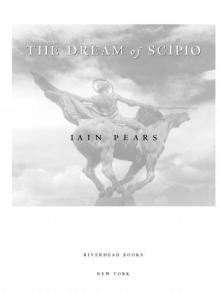 The Dream of Scipio
The Dream of Scipio Stone's Fall
Stone's Fall The Last Judgement
The Last Judgement An Instance of the Fingerpost
An Instance of the Fingerpost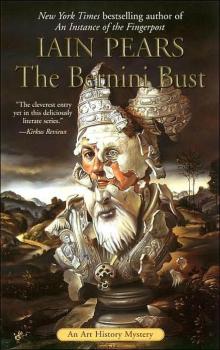 The Bernini Bust
The Bernini Bust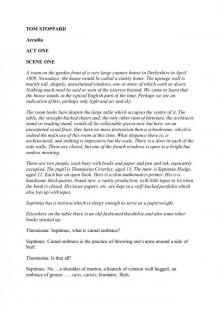 Arcadia
Arcadia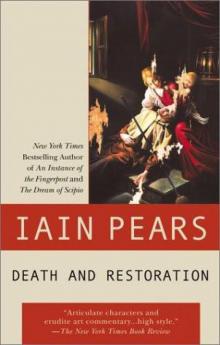 Death and Restoration
Death and Restoration The Raphael Affair
The Raphael Affair The Titian Committee
The Titian Committee The Immaculate Deception
The Immaculate Deception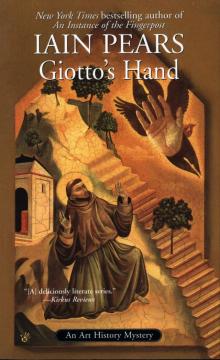 Giotto's hand
Giotto's hand The Portrait
The Portrait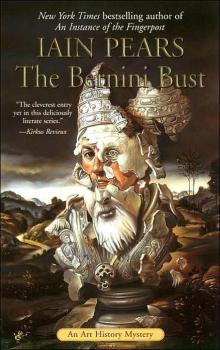 The Bernini Bust ja-3
The Bernini Bust ja-3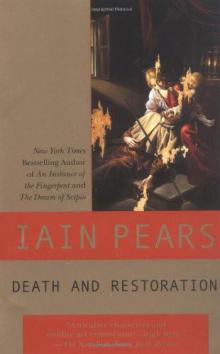 Death & Restoration ja-6
Death & Restoration ja-6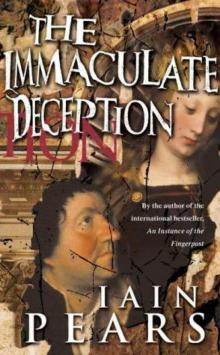 The Immaculate Deception ja-7
The Immaculate Deception ja-7